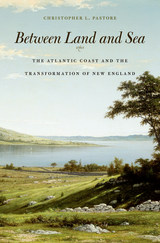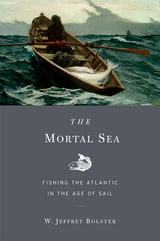
One of the largest estuaries on the North Atlantic coast, Narragansett Bay served as a gateway for colonial expansion in the seventeenth century and the birthplace of American industrialization in the late eighteenth. Christopher Pastore presents an environmental history of this watery corner of the Atlantic world, beginning with the first European settlement in 1636 and ending with the dissolution of the Blackstone Canal Company in 1849. Between Land and Sea traces how the Bay’s complex ecology shaped the contours of European habitation, trade, and resource use, and how littoral settlers in turn reconfigured the physical and cultural boundaries between humans and nature.
Narragansett Bay emerges in Pastore’s account as much more than a geological formation. Rather, he reimagines the nexus of land and sea as a brackish borderland shaped by the tension between what English settlers saw as improvable land and the perpetual forces of the North Atlantic Ocean. By draining swamps, damming rivers, and digging canals, settlers transformed a marshy coastal margin into a clearly defined edge. The resultant “coastline” proved less resilient, less able to absorb the blows of human initiative and natural variation than the soggy fractal of water and earth it replaced.
Today, as sea levels rise and superstorms batter coasts with increasing ferocity, Between Land and Sea calls on the environmentally-minded to make a space in their notions of progress for impermanence and uncertainty in the natural world.

Since the Viking ascendancy in the Middle Ages, the Atlantic has shaped the lives of people who depend upon it for survival. And just as surely, people have shaped the Atlantic. In his innovative account of this interdependency, W. Jeffrey Bolster, a historian and professional seafarer, takes us through a millennium-long environmental history of our impact on one of the largest ecosystems in the world.
While overfishing is often thought of as a contemporary problem, Bolster reveals that humans were transforming the sea long before factory trawlers turned fishing from a handliner's art into an industrial enterprise. The western Atlantic's legendary fishing banks, stretching from Cape Cod to Newfoundland, have attracted fishermen for more than five hundred years. Bolster follows the effects of this siren's song from its medieval European origins to the advent of industrialized fishing in American waters at the beginning of the twentieth century.
Blending marine biology, ecological insight, and a remarkable cast of characters, from notable explorers to scientists to an army of unknown fishermen, Bolster tells a story that is both ecological and human: the prelude to an environmental disaster. Over generations, harvesters created a quiet catastrophe as the sea could no longer renew itself. Bolster writes in the hope that the intimate relationship humans have long had with the ocean, and the species that live within it, can be restored for future generations.
READERS
Browse our collection.
PUBLISHERS
See BiblioVault's publisher services.
STUDENT SERVICES
Files for college accessibility offices.
UChicago Accessibility Resources
home | accessibility | search | about | contact us
BiblioVault ® 2001 - 2024
The University of Chicago Press









